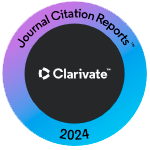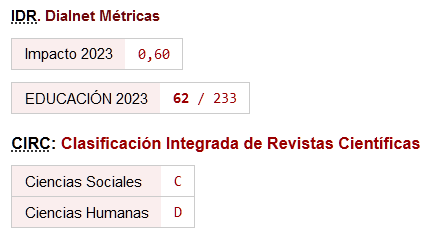Uso de Internet y la alfabetización en eSalud con temor al COVID-19 entre estudiantes de enfermería en Filipinas
DOI:
https://doi.org/10.46661/ijeri.5520Palabras clave:
COVID-19, alfabetización en eSalud, miedo, internet, estudiantesResumen
La situación del brote de COVID-19 puso de relieve no solo la seguridad sino también el bienestar mental de los estudiantes de enfermería. En la actualidad, no se comprende bien el nivel de miedo al COVID-19 y los factores asociados entre los estudiantes de enfermería en Filipinas. Esta encuesta transversal en línea determinó la relación entre el uso de Internet y la alfabetización en eSalud con el miedo al COVID-19. Mil trescientos sesenta y siete (n = 1.367) respondieron una encuesta en línea utilizando la Escala de alfabetización en salud electrónica (eHEALS) y la Escala de miedo a COVID-19 (FCV-19S) administradas del 1 al 15 de mayo de 2020. Estadísticas descriptivas , se realizaron pruebas de diferencias y análisis correlacional. Los resultados indicaron que la puntuación compuesta del FCV-19S fue de 3,65, lo que indica niveles de miedo de moderados a altos. El miedo al COVID-19 difirió significativamente según el sexo, el año y la ubicación. Se encontró una relación inversa significativa entre el uso diario promedio de Internet y el miedo al COVID-19. Por otro lado, no se observó una asociación significativa entre la alfabetización en eSalud y el miedo al COVID-19. La primera ola del brote de COVID-19 ha tenido un impacto de gran alcance en el bienestar psicológico de los estudiantes de enfermería. Este estudio destaca el valor de Internet y su uso durante el brote no siempre puede generar un mayor temor relacionado con el COVID-19. Las escuelas de enfermería pueden necesitar crear estrategias para promover el uso de Internet regulado y responsable, abordar las preocupaciones de salud mental de los estudiantes y desarrollar intervenciones para responder de manera proactiva para mitigar o reducir el miedo entre los estudiantes de enfermería durante la pandemia.
Descargas
Citas
Ahmad, A. R., & Murad, H. R. (2020). The impact of social media on panic during the COVID-19 pandemic in Iraqi Kurdistan: Online questionnaire study. Journal of Medical Internet Research, 22(5), e19556. https://doi.org/10.2196/19556
Ahorsu, D. K., Lin, C. Y., Imani, V., Saffari, M., Griffiths, M. D., & Pakpour, A. H. (2020). The fear of COVID-19 scale: Development and initial validation. International Journal of Mental Health and Addiction. https://doi.org/10.1007/s11469-020-00270-8
Aristovnik, A., Keržič, D., Ravšelj, D., Tomaževič, N., & Umek, L. (2020). Impacts of the COVID-19 pandemic on life of higher education students: A global perspective. Sustainability, 12(20), 8438. https://doi.org/10.3390/su12208438
Arora, A., Jha, A. K., Alat, P., & Das, S. S. (2020). Understanding coronaphobia. Asian Journal of Psychiatry, 54. https://doi.org/10.1016/j.ajp.2020.102384
Aslan, H., & Pekince, H. (2020). Nursing students' views on the COVID‐19 pandemic and their perceived stress levels. Perspectives in Psychiatric Care. https://doi.org/10.1111/ppc.12597
Bendau, A., Petzold, M. B., Pyrkosch, L., Maricic, L. M., Betzler, F., Rogoll, J., Große, J., Ströhle, A., & Plag, J. (2020). Associations between COVID-19 related media consumption and symptoms of anxiety, depression and COVID-19 related fear in the general population in Germany. European Archives of Psychiatry and Clinical Neuroscience. https://doi.org/10.1007/s00406-020-01171-6
Biana, H. T., & Joaquin, J. J. B. (2020). The ethics of scare: COVID-19 and the Philippines' fear appeals. Public Health, 183, 2-3. https://doi.org/10.1016/j.puhe.2020.04.017
Brørs, G., Norman, C. D., & Norekvål, T. M. (2020). Accelerated importance of eHealth literacy in the COVID-19 outbreak and beyond. European Journal of Cardiovascular Nursing, 19(6), 458-461. https://doi.org/10.1177/1474515120941307
Cao, W., Fang, Z., Hou, G., Han, M., Xu, X., Dong, J., & Zheng, J. (2020). The psychological impact of the COVID-19 epidemic on college students in China. Psychiatry Research, 112934. https://doi.org/10.1016/j.psychres.2020.112934
Caycho-Rodríguez, T., Vilca, L. W., Cervigni, M., Gallegos, M., Martino, P., Portillo, N., Barés, I., Calandra, M., & Videla, C. B. (2020). Fear of COVID-19 scale: Validity, reliability and factorial invariance in Argentina’s general population. Death Studies. https://doi.org/10.1080/07481187.2020.1836071
Chen, I. H., Chen, C. Y., Pakpour, A. H., Griffiths, M. D., & Lin, C. Y. (2020). Internet-related behaviors and psychological distress among schoolchildren during COVID-19 school suspension. Journal of the American Academy of Child and Adolescent Psychiatry, 59(10), 1099-1102. https://doi.org/10.1016/j.jaac.2020.06.007
Chong, Y. Y., Cheng, H. Y., Chan, H. Y. L., Chien, W. T., & Wong, S. Y. S. (2020). COVID-19 pandemic, infodemic and the role of eHealth literacy. International Journal of Nursing Studies, 108, 103644. https://doi.org/10.1016/j.ijnurstu.2020.103644
De, R.,Pandey, N., & Pal, A., (2020). Impact of digital surge during covid-19 pandemic: A viewpoint on research and practice. International Journal of Information Management, 55, 102171. https://doi.org/10.1016/j.ijinfomgt.2020.102171
Doshi, D., Karunakar, P., Sukhabogi, J. R., Prasanna, J. S., & Mahajan, S. V. (2020). Assessing coronavirus fear in Indian population using the fear of COVID-19 scale. International Journal of Mental Health and Addiction. https://doi.org/10.1007/s11469-020-00332-x
Elsharkawy, N. B., & Abdelaziz, E. M. (2020). Levels of fear and uncertainty regarding the spread of coronavirus disease (COVID‐19) among university students. Perspectives in Psychiatric Care. https://doi.org/10.1111/ppc.12698
Gabbiadini, A., Baldissarri, C., Durante, F., Valtorta, R. R., De Rosa, M., & Gallucci, M. (2020). Together apart: The mitigating role of digital communication technologies on negative affect during the COVID-19 outbreak in Italy. Frontiers in Psychology, 11, 2763. https://doi.org/10.3389/fpsyg.2020.554678
Gao, J., Zheng, P., Jia, Y., Chen, H., Mao, Y., Chen, S., Wang, Y., Fu, H., & Dai, J. (2020). Mental health problems and social media exposure during COVID-19 outbreak. Plos One, 15(4), e0231924. https://doi.org/10.1371/journal.pone.0231924
González-Padilla, D. A., & Tortolero-Blanco, L. (2020). Social media influence in the COVID-19 Pandemic. International Braz J Urol, 46(suppl.1), 120-124. https://doi.org/10.1590/s1677-5538.ibju.2020.s121.
Hampton, K., Lee, R., Lu, W., Shin, I., & Purcell, K. (2015). Psychological stress and social media use. Pew Research Center. https://www.pewresearch.org/internet/2015/01/15/psychological-stress-and-social-media-use-2/#fn-12666-16
Harnett, S. (2020). Health literacy, social media and pandemic planning. Journal of Consumer Health on the Internet, 24(2), 157-162. https://doi.org/10.1080/15398285.2020.1756677
Harper, C. A., Satchell, L. P., Fido, D., & Latzman, R. D. (2020). Functional fear predicts public health compliance in the COVID-19 pandemic. International Journal of Mental Health and Addiction. https://doi.org/10.1007/s11469-020-00281-5
Hossain, M. A., Jahid, M. I. K., Hossain, K. M. A., Walton, L. M., Uddin, Z., Haque, M. O., Kabir , M.F., Arafat, S. M. Y., Sakel, M. Faruqui, R., & Hossain, Z. (2020). Knowledge, attitudes, and fear of COVID-19 during the rapid rise period in Bangladesh. Plos One, 15(9), e0239646. https://doi.org/10.1371/journal.pone.0239646
Huang, L., Lei, W., Xu, F., Liu, H., & Yu, L. (2020). Emotional responses and coping strategies in nurses and nursing students during Covid-19 outbreak: A comparative study. Plos One, 15(8), e0237303. https://doi.org/10.1371/journal.pone.0237303
Király, O., Potenza, M. N., Stein, D. J., King, D. L., Hodgins, D. C., Saunders, J. B., ... & Abbott, M. W. (2020). Preventing problematic internet use during the COVID-19 pandemic: Consensus guidance. Comprehensive Psychiatry, 152180. https://doi.org/10.1016/j.comppsych.2020.152180
Konstantinov, V., Berdenova, S., Satkangulova, G., Reznik, A., & Isralowitz, R. (2020). COVID-19 impact on Kazakhstan university student fear, mental health, and substance use. International Journal of Mental Health and Addiction. https://doi.org/10.1007/s11469-020-00412-y
Li, X., & Liu, Q. (2020). Social media use, eHealth literacy, disease knowledge, and preventive behaviors in the COVID-19 pandemic: Cross-sectional study on Chinese netizens. Journal of Medical Internet Research, 22(10), e19684. https://doi.org/10.2196/19684
Lin, C. Y., Broström, A., Griffiths, M. D., & Pakpour, A. H. (2020a). Investigating mediated effects of fear of COVID-19 and COVID-19 misunderstanding in the association between problematic social media use, psychological distress, and insomnia. Internet Interventions, 21, 100345. https://doi.org/10.1016/j.invent.2020.100345
Lin, C. Y., Ganji, M., Griffiths, M. D., Bravell, M. E., Broström, A., & Pakpour, A. H. (2020b). Mediated effects of insomnia, psychological distress and medication adherence in the association of eHealth literacy and cardiac events among Iranian older patients with heart failure: A longitudinal study. European Journal of Cardiovascular Nursing, 19(2), 155-164. https://doi.org/10.1177/1474515119873648
Mamun, M. A., & Griffiths, M. D. (2020). First COVID-19 suicide case in Bangladesh due to fear of COVID-19 and xenophobia: Possible suicide prevention strategies. Asian Journal of Psychiatry, 51, 102073. https://doi.org/10.1016/j.ajp.2020.102073
Mertens, G., Gerritsen, L., Duijndam, S., Salemink, E., & Engelhard, I. M. (2020). Fear of the coronavirus (COVID-19): Predictors in an online study conducted in March 2020. Journal of Anxiety Disorders, 74, 102258. https://doi.org/10.1016/j.janxdis.2020.102258
Monkmana, H., Kushniruka, A. W., Barnetta, J., Boryckia, E. M., Greinerb, L. E., & Sheetsc, D. (2017). Are health literacy and eHealth literacy the same or different?. Studies in Health Technology and Informatics, 245:178-182. https://doi.org/10.3233/978-1-61499-830-3-178
Moralista, R. B., & Oducado, R. M. F. (2020). Faculty perception toward online education in a state college in the Philippines during the coronavirus disease 19 (COVID-19) pandemic. Universal Journal of Educational Research, 8(10), 4736-4742. https://doi.org/10.13189/ujer.2020.081044
Moscadelli, A., Albora, G., Biamonte, M. A., Giorgetti, D., Innocenzio, M., Paoli, S. Lorini, C., Bonanni, P., & Bonaccorsi, G. (2020). Fake news and Covid-19 in Italy: Results of a quantitative observational study. International Journal of Environmental Research and Public Health, 17(16), 5850. https://doi.org/10.3390/ijerph17165850
Mussi, F. C., Pires, C. G. D. S., Silva, R. M. D., Macedo, T. T. S. D., & Santos, C. A. D. S. T. (2020). Stress level among undergraduate nursing students related to the training phase and sociodemographic factors. Revista Latino-Americana de Enfermagem, 28. https://doi.org/10.1590/1518-8345.3036.3209
Neter, E., & Brainin, E. (2019). Association between health literacy, ehealth literacy, and health outcomes among patients with long-term conditions. European Psychologist, 24, 68-81. https://doi.org/10.1027/1016-9040/a000350
Nguyen, H. T., Do, B. N., Pham, K. M., Kim, G. B., Dam, H. T. B., Nguyen, T. T., Nguyen, T. T. P., Nguyen, Y. H., Sørensen, K., Pleasant, A., & Duong, T. Van. (2020). Fear of covid-19 scale-associations of its scores with health literacy and health-related behaviors among medical students. International Journal of Environmental Research and Public Health, 17(11), 4164. https://doi.org/10.3390/ijerph17114164
Njim, T., Mbanga, C., Mouemba, D., Makebe, H., Toukam, L., Kika, B., & Mulango, I. (2020). Determinants of depression among nursing students in Cameroon: A cross-sectional analysis. BMC Nursing, 19(26). https://doi.org/10.1186/s12912-020-00424-y
Norman, C. D., & Skinner, H. A. (2006a). eHEALS: the eHealth literacy scale. Journal of Medical Internet Research, 8(4), e27. https://doi.org/10.2196/jmir.8.4.e27
Norman, C. D., & Skinner, H. A. (2006b). eHealth literacy: Essential skills for consumer health in a networked world. Journal of Medical Internet Research, 8(2), e9. https://doi.org/10.2196/jmir.8.2.e9
Oducado, R. M. F., Frigillano, P. R. S., Gunce, J. J. T., Jover, P. L. B., Meliton, P. N., & Pangilinan, K. T. (2017). Guidance needs of nursing students in Iloilo City, Philippines. PEERS Inc. Multidisciplinary Research Journal, 1(2), 35-47. http://hdl.handle.net/10755/17285
Oducado, R. M. F. (2019). Gen Z nursing students' usage, perception and satisfaction with facebook for educational purposes: Tool for learning or distraction. Indonesian Nursing Journal of Education and Clinic, 4(1), 79-89. http://dx.doi.org/10.24990/injec.v4i1.241
Oducado, R. M. F., Sales, M. R., Magarzo, A. J. P., Panes, P. M. A., & Lapastora, J. T. P. (2019). Perceptions and attitude on using social media responsibly: Toward social media literacy in nursing education. Belitung Nursing Journal, 5(3), 116-122. https://doi.org/10.33546/bnj.789
Oducado, R. M. F. & Moralista, R. B. (2020). Filipino nursing students' ehealth literacy and criteria used for selection of health websites. Annals of Tropical Medicine & Public Health; 23(S13B), SP231343. http://doi.org/10.36295/ASRO.2020.231343
Oducado, R. M. F., Rabacal, J. S., Moralista, R. B., & Tamdang, K. A. (2021a). Perceived stress due to COVID-19 pandemic among employed professional teachers. International Journal of Educational Research and Innovation, 15, 305-316. https://doi.org/10.46661/ijeri.5284
Oducado, R. M. F., Parreño-Lachica, G. M. & Rabacal, J. S., (2021b). Personal resilience and its influence on COVID-19 stress, anxiety and fear among graduate students in the Philippines. International Journal of Educational Research and Innovation, 15, 419-431. https://doi.org/10.46661/ijeri.5484
Oh, S.-H., Lee, S. Y., & Han, C. (2020). The effects of social media use on preventive behaviors during infectious disease outbreaks: The mediating role of self-relevant emotions and public risk perception. Health Communication. https://doi.org/10.1080/10410236.2020.1724639
Pang, N. T. P., Kamu, A., Hambali, N. L. B., Mun, H. C., Kassim, M. A., Mohamed, N. H., Ayu, F., Sharizman, S., Rahim, S. A., Omar, A., & Jeffree, M. S. (2020). Malay version of the fear of COVID-19 scale: Validity and reliability. International Journal of Mental Health and Addiction. https://doi.org/10.1007/s11469-020-00373-2
Perz, C. A., Lang, B. A., & Harrington, R. (2020). Validation of the fear of COVID-19 scale in a US college sample. International Journal of Mental Health and Addiction. https://doi.org/10.1007/s11469-020-00356-3
Philippine Department of Health. (2020). DOH COVID-19 case bulletin # 274. https://www.doh.gov.ph/covid-19/case-tracker
Rabacal, J. S., Oducado, R. M. F., & Tamdang, K. A. (2020). COVID-19 impact on the quality of life of teachers: A cross-sectional study. Asian Journal for Public Opinion Research, 8(4), 478-492. https://doi.org/10.15206/ajpor.2020.8.4.478
Rahman, M. A., Hoque, N., Alif, S. M., Salehin, M., Islam, S. M. S., Banik, B., Sharif, A., Nazim, NB, Sultana, F., & Cross, W. (2020). Factors associated with psychological distress, fear and coping strategies during the COVID-19 pandemic in Australia. Globalization and Health, 16(1), 1-15. https://doi.org/10.1080/07481187.2020.1836071
Reznik, A., Gritsenko, V., Konstantinov, V., Khamenka, N., & Isralowitz, R. (2020). COVID-19 fear in Eastern Europe: Validation of the fear of COVID-19 scale. International Journal of Mental Health and Addiction. https://doi.org/10.1007/s11469-020-00283-3
Rodríguez-Hidalgo, A. J., Pantaleón, Y., Dios, I., & Falla, D. (2020). Fear of COVID-19, stress, and anxiety in university undergraduate students: A predictive model for depression. Frontiers in Psychology, 11, 3041. https://doi.org/10.3389/fpsyg.2020.591797
Ross, J. G., & Myers, S. M. (2017). The current use of social media in undergraduate nursing education: A review of the literature. CIN: Computers, Informatics, Nursing, 35(7), 338-344. https://doi.org/10.1097/CIN.0000000000000342
Saravanan, C., Mahmoud, I., Elshami, W., & Taha, M. H. (2020). Knowledge, anxiety, fear, and psychological distress about COVID-19 among university students in the United Arab Emirates. Frontiers in Psychiatry, 11. https://doi.org/10.3389/fpsyt.2020.582189
Satici, B., Gocet-Tekin, E., Deniz, M. E., & Satici, S. A. (2020). Adaptation of the fear of COVID-19 scale: Its association with psychological distress and life satisfaction in Turkey. International Journal of Mental Health and Addiction. https://doi.org/10.1007/s11469-020-00294-0
Savitsky, B., Findling, Y., Ereli, A., & Hendel, T. (2020). Anxiety and coping strategies among nursing students during the covid-19 pandemic. Nurse Education in Practice, 46, 102809. https://doi.org/10.1016/j.nepr.2020.102809
Son, C., Hegde, S., Smith, A., Wang, X., & Sasangohar, F. (2020). Effects of COVID-19 on college students' mental health in the United States: Interview survey study. Journal of Medical Internet Research, 22(9), e21279. https://doi.org/10.2196/21279
Soraci, P., Ferrari, A., Abbiati, F. A., Del Fante, E., De Pace, R., Urso, A., & Griffiths, M. D. (2020). Validation and psychometric evaluation of the Italian version of the Fear of COVID-19 Scale. International Journal of Mental Health and Addiction. https://doi.org/10.1007/s11469-020-00277-1
Tee, M. L., Tee, C. A., Anlacan, J. P., Aligam, K. J. G., Reyes, P. W. C., Kuruchittham, V., & Ho, R. C. (2020). Psychological impact of COVID-19 pandemic in the Philippines. Journal of Affective Disorders, 277, 379-391. https://doi.org/10.1016/j.jad.2020.08.043
Ventola, C. L. (2014). Social media and health care professionals: benefits, risks, and best practices. P & T: A Peer-Reviewed Journal for Formulary Management, 39(7), 491-520. https://www.ncbi.nlm.nih.gov/pmc/articles/PMC4103576/
World Health Organization. (2020a). WHO coronavirus disease (COVID-19) dashboard. https://covid19.who.int/?gclid=CjwKCAiAlNf-BRB_EiwA2osbxQrFudstcjbDvNgdQ6hsZluDeBxvRoq5ixPHc_3cX5kpodGpmdtFvRoCINsQAvD_BwE
World Health Organization. (2020b). Call for action: Managing the infodemic. https://www.who.int/news/item/11-12-2020-call-for-action-managing-the-infodemic
World Health Organization. (2020c). Managing the COVID-19 infodemic: Promoting healthy behaviors and mitigating the harm from misinformation and disinformation. https://www.who.int/news/item/23-09-2020-managing-the-covid-19-infodemic-promoting-healthy-behaviours-and-mitigating-the-harm-from-misinformation-and-disinformation
World Health Organization. (2020d). Mental health and psychosocial considerations during the COVID-19 outbreak. https://www.who.int/docs/default-source/coronaviruse/mental-health-considerations.pdf
Xu, C., Zhang, X., & Wang, Y. (2020). Mapping of health literacy and social panic via web search data during the COVID-19 public health emergency: Infodemiological study. Journal of Medical Internet Research, 22(7), e18831. https://doi.org/10.2196/18831
Yang, B. X., Xia, L., Huang, R., Chen, P., Luo, D., Liu, Q., Kang, L. J., Zhang, Z., Liu, Z., Yu, S., Li, X., & Wang, X.Q. (2020). Relationship between eHealth literacy and psychological status during COVID‐19 pandemic: A survey of Chinese residents. Journal of Nursing Management. https://doi.org/10.1111/jonm.13221
Descargas
Publicado
Cómo citar
Número
Sección
Licencia
Derechos de autor 2021 Ryan Michael Oducado, Cyruz Tuppal , Homelo Estoque , Jonaid Sadang , Daryl Superio , Don Vicente Real, Mary Nellie Roa , Xerxes Malaga, Jejomar Quiros , Maria Teresa Fajardo, Ronnell D. Dela Rosa.

Esta obra está bajo una licencia internacional Creative Commons Atribución-NoComercial-SinDerivadas 4.0.











